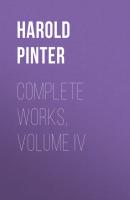Complete Works, Volume IV. Harold Pinter
Чтение книги онлайн.

Читать онлайн книгу Complete Works, Volume IV - Harold Pinter страница 2
Название: Complete Works, Volume IV
Автор: Harold Pinter
Издательство: Ingram
Жанр: Зарубежная драматургия
Серия: Pinter, Harold
isbn: 9780802192264
isbn:
INTRODUCTION
A speech made by Harold Pinter in Hamburg, West Germany, on being awarded the 1970 German Shakespeare Prize.
When I was informed that I was to be given this award my reaction was to be startled, even bewildered, while at the same time to feel deeply gratified by this honour. I remain honoured and slightly bewildered, but also frightened. What frightens me is that I have been asked to speak to you today. If I find writing difficult I find public address doubly so.
Once, many years ago, I found myself engaged uneasily in a public discussion on the theatre. Someone asked me what my work was ‘about.’ I replied with no thought at all and merely to frustrate this line of enquiry: ‘The weasel under that cocktail cabinet.’ That was a great mistake. Over the years I have seen that remark quoted in a number of learned columns. It has now seemingly acquired a profound significance, and is seen to be a highly relevant and meaningful observation about my own work. But for me the remark meant precisely nothing. Such are the dangers of speaking in public.
In what way can one talk about one’s work? I’m a writer, not a critic. When I use the word work I mean work. I regard myself as nothing more than a working man.
I am moved by the fact that the selection committee for the Shakespeare Prize has judged my work, in the context of this award, as worthy of it, but it’s impossible for me to understand the reasons that led them to their decision. I’m at the other end of the telescope. The language used, the opinions given, the approvals and objections engendered by one’s work happen in a sense outside one’s actual experience of it, since the core of that experience consists in writing the stuff. I have a particular relationship with the words I put down on paper and the characters which emerge from them which no one else can share with me. And perhaps that’s why I remain bewildered by praise and really quite indifferent to insult. Praise and insult refer to someone called Pinter. I don’t know the man they’re talking about. I know the plays, but in a totally different way, in a quite private way.
If I am to talk at all I prefer to talk practically about practical matters, but that’s no more than a pious hope, since one invariably slips into theorising, almost without noticing it. And I distrust theory. In whatever capacity I have worked in the theatre, and apart from writing, I have done quite a bit of acting and a certain amount of directing for the stage, I have found that theory, as such, has never been helpful; either to myself, or, I have noticed, to few of my colleagues. The best sort of collaborative working relationship in the theatre, in my view, consists in a kind of stumbling erratic shorthand, through which facts are lost, collided with, fumbled, found again. One excellent director I know has never been known to complete a sentence. He has such instinctive surety and almost subliminal powers of communication that actors respond to his words before he has said them.
I don’t want to imply that I am counselling lack of intelligence as a working aid. On the contrary, I am referring to an intelligence brought to bear on practical and relevant matters, on matters which are active and alive and specific, an intelligence working with others to find the legitimate and therefore compulsory facts and make them concrete for us on the stage. A rehearsal period which consists of philosophical discourse or political treatise does not get the curtain up at eight o’clock.
I have referred to facts, by which I mean theatrical facts. It is true to say that theatrical facts СКАЧАТЬ